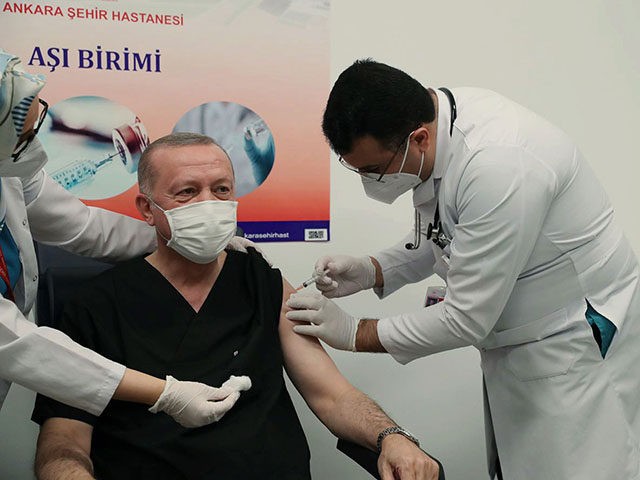Turkish opposition leaders and the general public expressed outrage Wednesday after Islamist President Recep Tayyip Erdogan claimed that he received a third dose of “Coronavac,” a Chinese-made coronavirus vaccine candidate.
Sinovac Biotech, the Chinese company that developed Coronavac, recommends only two doses of its product. Coronavac is believed to be one of the lowest-quality coronavirus vaccine candidates widely available around the world, testing at only 50.38 percent efficacy in clinical trials. Nations that have relied on Coronavac or other Chinese products for their vaccination programs, like Seychelles and Chile, have experienced large surges in the number of coronavirus cases occurring alongside an increase in the number of fully vaccinated people, suggesting poor performance by the vaccines.
As a result, Sinovac and the Chinese government have considered a third “booster” dose or blending the product with more successful vaccines but have not officially recommended either of these paths as they currently remain a matter of experimentation.
Erdogan’s remarks in the Tuesday interview with TRT, Turkey’s public broadcaster, did not clarify if he received a third dose of Coronavac or if he received a dose of a different vaccine product.
“I received three doses of the vaccine, and then I checked to see if there was an increase in my antibody levels. Thank God, I reached 2,160 [units per milliliter],” Erdogan told the network, according to a translation by the dissident outlet Turkish Minute.
Erdogan did not elaborate on when he received the third dose or why doctors recommended it. According to Ahval, another independent Turkish news outlet, Erdogan received his second dose of Coronavac on February 11. His first dose, on January 14, was a nationally televised event, intended to inspire confidence in the vaccines and increase interest from the general public.
Turkey has endured a severe local coronavirus epidemic. As of Thursday, the government has documented nearly 5.3 million coronavirus cases within its borders since the pandemic began and 47,768 deaths. Its case count is higher than all but four countries in the world, not taking into consideration the fact that evidence suggests rogue states like China, Russia, and Iran have significantly undercounted their coronavirus case and death numbers.
Turkey has administered nearly 30 million doses of all available Chinese coronavirus vaccine products in the country as of Thursday. As most products require two doses, this translates to about 13 million fully vaccinated people and 16.6 million people still waiting to complete their dosages, according to Ahval. Turkey has a population of about 84 million people, meaning only about 15 percent of the country is fully vaccinated.
Erdogan’s claim to receiving a third dose of Coronavac leaves open the possibility that other high-ranking officials of his Justice and Development Party (AKP) have also received unauthorized third doses, meaning even fewer people in the country may be fully vaccinated.
The Turkish president has previously blamed “severe injustices” on a global scale for both Turkey’s and the world’s low vaccination rates. In remarks in May at the Global Health Summit, Erdogan claimed alleged vaccine inequality was especially damaging to places like sub-Saharan Africa and that the world’s wealthiest countries have a responsibility to share their vaccine doses.
“While a majority of the population in developed countries has been vaccinated with at least one dose, this rate has not reached even 1% in Sub-Saharan Africa,” Erdogan argued. “We support the efforts of multilateral financial institutions and initiatives for fair access to vaccines.”
In reality, dosage shortages have not been a significant deterrent to vaccination in Africa. Multiple nations, such as Malawi and South Sudan, have returned or destroyed thousands of doses of Chinese coronavirus vaccines donated through Covax, the World Health Organization’s (W.H.O.) program to distribute vaccines to underdeveloped countries. The nations cited a general lack of public demand and an inability to keep the vaccines for long without them expiring as the reasons doctors could not use them.
Erdogan also floated the possibility that Turkey would soon have a domestically developed vaccine to share with the world “as soon as it is ready.” China’s state-run Anadolu news agency claimed last week that the Turkish vaccine candidate had passed Phase I clinical trials, the first of three phases that traditionally precede approval for mass distribution.
Turkish Minute noted that opposition politicians in the county did not consider Erdogan’s complaints about wealthy nations as sufficient to justify his own receipt of three vaccine doses.
“While [some] people can’t even get one dose, Erdoğan gets three,” one opposition leader, deputy group chairman of the Republican People’s Party (CHP) Engin Özkoç, objected on Wednesday.
A CHP lawmaker, Murat Emir, accused Erdogan’s government of “favoritism” in distributing the vaccines and of hoarding nearly 200,000 doses of coronavirus vaccines arriving prior to Ankara’s official announcement that it had acquired vaccine doses.
Turkish Health Minister Fahrettin Koca announced on Monday that Ankara had cut a deal with BioNTech, the partner of the American company Pfizer, to purchase 12 million doses of its coronavirus vaccine. The Pfizer vaccine has tested at 95-percent efficacy in preventing coronavirus infections, making it among the highest-performing vaccines against coronavirus widely available currently.
“In our talk with Ugur Sahin (the CEO and co-founder of BioNTech), he said he got permission to export 12 million doses of vaccine,” Koca said. “They said, ‘Starting this week, we’re sending these 12 million vaccines gradually till next weekend.”
The vaccines will reportedly be available to the general public this month.

COMMENTS
Please let us know if you're having issues with commenting.